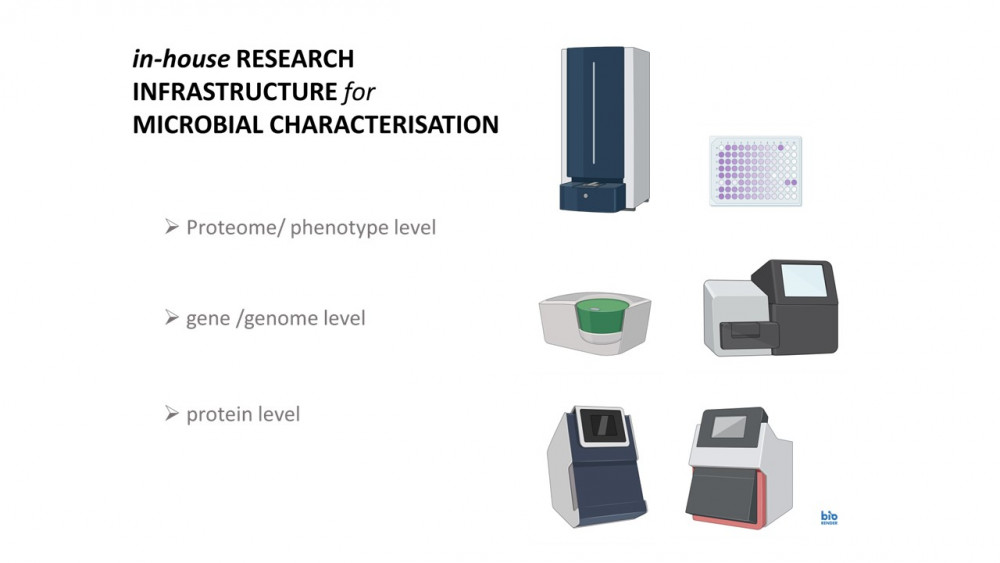Infrastructure
Facilities
KPD is located at the new premises of the Faculty of Biology of the University of Gdansk, Baltic Campus, built under the Operational Programme Infrastructure and Environment, co-financed by The European Regional Development Fund (ERDF). It possesses independent, fully equipped BSL-2 laboratories (with a total area of circa 100 square meters), including a laboratory for microbial identification and characterisation, samples repository, lyophilisation room, room for liquid nitrogen storage, and office space dedicated to the storage of data and documentation pertaining to the culture collection.
With the Department of Microbiology located on the same floor, KPD shares a media-preparation room, glassware washing room, sterilisation room with several autoclaves, cold storage rooms, incubation rooms, dark room and stockroom for safe chemical storage. Also, it has full access to molecular biology laboratories located in the Department of Microbiology and all shared infrastructure within the Faculty of Biology.
Access to all laboratories is under electronic surveillance with CCTV cameras and restricted to the staff with digitally programmed key cards preventing unauthorised access to the facilities and ensuring that only the qualified personnel within the facilities can access the stored biological material.
The regulations for access to KPD equipment are available below as a downloadable file.
Regulations for Access to KPD Equipment
| Załącznik | Size |
|---|---|
| regulamin-sprzet-kpd.docx | 31.8 KB |
Research Infrastructure
KPD was instrumental in placing microbial culture collections on the Polish Roadmap of Research Infrastructures, defining undertakings of strategic importance to the development of Polish science and its competitiveness, in 2014. This success was followed by three consecutive investment grants from the Polish Ministry of Science and Higher Education for purchasing capital equipment. The government funding enabled KPD to develop state-of-the-art research infrastructure and create an open and collaborative environment for conducting excellent research. The cutting-edge technology implemented at KPD is used by several research teams in studies supported by the Polish National Science Centre and going beyond the areas of microbiology.
KPD’s state-of-the-art research infrastructure enables the long-term preservation of deposited microorganisms, maintaining their physical, genetic, and functional stability, as well as the distribution of authenticated microbial strains and DNA samples (e.g. recombinant plasmids)
KPD’s equipment encompasses orbital shakers and culture incubators, gradient thermocyclers, TapeStation for DNA capillary electrophoresis, an automated system for digital PCR, an automated liquid handling system (epMotion station), MiSeq next-generation sequencer, MALDI TOF spectrometer (MALDI Biotyper) for rapid microbial identification and Omnilog Combo Plus ID system for automated microbial identification and cell phenotyping. KPD also possess a platform for complex biochemical and biophysical protein characterization allowing for the determination of protein thermal and chemical stability as well as measuring biomolecular interactions (Monolith and Prometheus).
Equipment for long-term preservation includes an isothermal liquid nitrogen freezer with an auto-fill and monitor system, which controls the automatic filling of the liquid nitrogen jacket, deep freezers and lab refrigerators, enabling storage of samples at +4°C, -20°C, -80°C and -196°C. Cultures received for deposit are preserved as glycerol stock at -80°C, by freeze-drying and/or in liquid nitrogen vapour. All storage spaces, as well as laboratories, are equipped with an alarm system and are continuously monitored for temperature.
Access to all laboratories is under electronic surveillance with CCTV cameras and restricted to the staff with digitally programmed key cards preventing unauthorized access to the facilities and ensuring only the appropriate people within the facilities can access the stored biological material.

![]()




